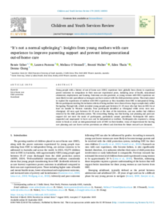Young people with a history of out of home care (OHC) experience have globally been shown to experience poorer outcomes in comparison to their non-care experienced peers, including areas of health, educational attainment, employment, and housing. Outcomes are also gendered, as young women with OHC experience are more likely to enter parenthood as teenagers and have contact with the child protection system. This study aimed to explore the experiences of mothers with OHC experience as they transition from OHC to independent living. Eleven participants meeting the inclusion criteria of being mothers were chosen from a larger sample study called Navigating Through Life, which recruited young people aged between 15–25 years who had been in OHC for at least six months in Western Australia. Four participants identified as Aboriginal while seven were non-Aboriginal. All were aged between 18–25 years at the time of the interviews, and one mother had children removed by the child protection system. The overarching finding was that leaving care planning and post-care support did not meet the needs of participants, particularly around parenthood. Participants felt under-supported and unprepared to leave care and be independent as mothers. Participants also expressed a strong desire to break or avoid an intergenerational cycle of OHC in their families. Areas of improvement for leaving care planning and care leaver service provisions are offered and directions for future research are discussed.

